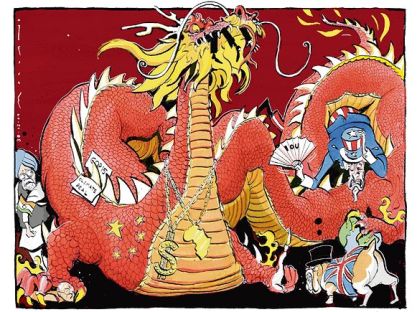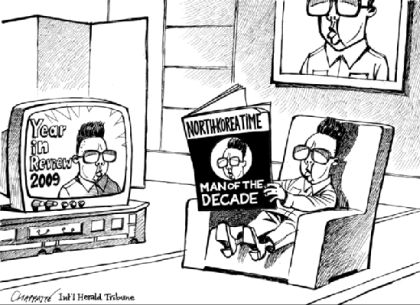
Gazeta, Russia
2009: Another 'Chinese' Year
"Although
almost all of the attention in 2009 has been focused on President Obama, the
greatest influence on global politics has probably been exerted by China. … China's
Communist Party functionaries gracefully outplayed Obama."
By Fyodor Lukyanov*

Translated by Yekaterina Blinova
December 25, 2009
Russia - Gazeta - Original Article (Russian)
|
Argentine Federal Judge
Octavio de Lamadrid has a chance to enter the annals of history. The decision
to issue a warrant for the arrest
of the former Chairman of the Chinese Communist Party, Jiang
Zemin, for crimes against humanity
(suppression of the Falun Gong
religious movement) is in sharp contrast with the general political atmosphere that
has developed around China.
Since 1999, when the country
was headed by Jiang Zemin and the PRC [Peoples' Republic of China] announced its
entry into a globalized world with Chinese investment, the PRC's weight on the
international stage has grown steadily. China deliberately focused almost
exclusively on the expansion of its own economic capacity while eschewing
political ambition. This has provoked confusion among others - it's unclear how
to conduct oneself with them. And as the situation is unclear, everyone at
least tries to be cautious. For instance, with the recent suppression of protests
in the Xinjiang Uighur Autonomous Region, the Western world responded with restraint, far different
from the response to the events in Tibet a year earlier.
Although almost all of the
attention in the past year has been focused on U.S. President Barack Obama, the
greatest influence on global politics has most likely been exerted by
China. And China has done so not so much with its actions, but through its
sheer presence.
The year began with almost
simultaneous statements by the two gurus of American foreign policy - Zbigniew
Brzezinski and Henry Kissinger - regarding the fact that America and China must
create something like a duumvirate for global governance. The January statement
by Treasury Secretary Timothy Geithner
criticizing Beijing for the under-devalued yuan put China on high alert, but
there was no follow-up: during his trip to Beijing in the second half of the
year, Geithner sought to diffuse the tension. The February visit to Beijing of newly-appointed
Secretary of State Hillary Clinton set the tone for the dialogue: The United
States outlined what it wanted from the PRC (assistance in supporting financial
and economic stability), and what they aren't planning (interfere in China’s
internal affairs).
China’s answer to this series
of curtseys rapidly became clear. The idea of the "Big Two" didn't
provoke enthusiasm. Beijing saw in this America's desire to guarantee China's continued
financing of its deficit, in other words - the inflating of a new bubble based
on the model that has already led to a worldwide recession. Over the course of
the year, senior Chinese officials made a number of harsh statements of this
general orientation: "Regrettably, today we have no alternative but to
invest in American bonds and dollars; but this must stop as quickly as
possible." The reasoning behind the creation of other reserve currencies
and the reorientation of the Chinese economy from foreign markets (primarily
American) to the domestic one - is the refrain of 2009. It is clear that both
are a matter of time - a long time - but the direction of events is clearly
marked.

China’s policy priority is clear
as well - not to take responsibility for anything that doesn't directly affect
Beijing. The development of the situation with Iran, Afghanistan and Pakistan,
which have largely determined global events, have been discussed without the active
participation China.
While invisible, Beijing was nevertheless
present, since its economic interests in Pakistan and Iran are very high and
Afghanistan is part of a region in which nothing can be done without the PRC.
But China has avoided engaging in such conversations, seeing, for example, how a
torn Russia is trying to maintain the geopolitical balance and not spoil relations
with the United States, but at the same time distance itself from American
policy and maintain its own economic interests.
Thus, Beijing’s position on sanctions
against Iran is very simple. If Russia allows its relations with Washington and
European capitals to be aggravated and votes “no,” China will offer moral
support without conflict with anyone on its own. But if Moscow agrees with sanctions,
Beijing will abstain, again maintaining good relations with everyone - including
Tehran. Beijing appears somewhat more willing to act in regard to North Korea.
But here it would like to minimize its own risk in regard to its volatile neighbor
by participating in global efforts [Six-Party Talks] to de-nuclearize
Pyongyang.

[International Herald
Tribune, France]
The October celebration of China's
60th anniversary became yet another symbol of forward motion. But the most revealing
in terms of Beijing's global position was the China visit of the U.S. president
and the Copenhagen conference on climate change.
China's Communist Party functionaries
gracefully outplayed Obama. He was shown honor and respect, but was received just
like any other American president - no more and no less. There would have been
nothing unusual about the visit without Barack Obama's special character. In
many respects, his foreign policy resources are based on the image of an untraditional
politician who lays the foundation for a new international system, and therefore
deserves special treatment. In Shanghai and Beijing, Obama was allowed to go
through all of the obligatory motions, but their effect was carefully limited -
some of the events the U.S. president participated in weren't shown or were shown
in a special way: some events had smaller audiences than expected and certain
questions weren't asked. Overall, the visit came out looking fairly bland.
Posted by WORLDMEETS.US
At the Copenhagen climate summit,
Beijing demonstrated the futility of attempting to impose global obligations on
it. In order to control the formulation of the final declaration, Americans had
to “shove” their European allies to the side and negotiate directly with China
in order to prevent major developing countries from making a deal without American
participation.
For Russian-Chinese relations,
it has been a remarkable year. The issuance of billions of dollars of credits
extended to our state-run oil companies, decisive intervention in the Cherkizovsky
market situation [see below], as well as pledges of a future visit by Prime Minister
Putin to Beijing - all indicate greater Chinese attention to economic opportunities
in Russia. This transforms the nature of relations, because China grows
stronger when discussions about a multi-polar world are bolstered by objective economic
interests.
[Editor's Note: Moscow's "Cherkizovskiy
market" was the largest open-air market in the world, and became a symbol of
the criminal business practices, corruption and mafia wars of the 1990s. It was
finally closed by the authorities in June, 2009. In July, China sent a delegation to negotiate on behalf of Chinese vendors at the former market.]
In this connection, Russia
faces the acute problem of formulating a clear strategy in the direction of
China and more broadly, Asia. Up to now, Moscow has largely limited itself to
general political statements about the importance of this region. China’s
presence is becoming a more important factor in Russian policy on the world stage
and in regions vital to Russian interests. For example, the end of the year was
marked by a debilitating competition between Russia and China for access to
Central Asian resources. So far, Beijing and Moscow have played to a draw (the
launch of the first post-Soviet gas pipeline into China, which happened without
Russia’s participation, versus the new contract for Gazprom to supply gas to
Turkmenistan) and has forced Europeans to think. But this isn't the end. It's just
the beginning of the game. Just look at the determination with which China is implementing
its strategy of conquering resources and markets, for example, in Africa.
Russia and America are, of
course, in entirely different positions in respect to China. For Russia, China
is the largest and most influential neighbor with which relations will
hopefully take on an increasingly asymmetric character. For the United States,
it is the main partner with whom economic ties, due to certain specifics, are
becoming increasingly political in nature.
Posted by WORLDMEETS.US
At the same time, while China
is Russia’s regional competitor, to the United States it is a potentially
global one.
Be that as it may, for both America and Russia, developing forms of coexistence with China is perhaps, the central systemic challenge of this century. There are no answers yet, although the scale of the questions grows larger and larger every year.
*Fyodor Lukyanov is Chief
Editor for the magazine Russian in Global Affairs
CLICK HERE FOR RUSSIAN
VERSION
Posted by WORLDMEETS.US, Dec. 31, 1:30pm
